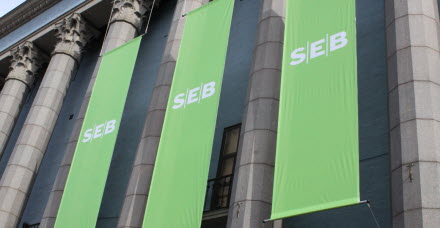
STOCKHOLM: Skandinaviska Enskilda Banken (SEB) Board of Directors has revised the financial targets for the group, with the objective to create further financial flexibility to better support the bank’s customers over time.
According to the new targets, the bank will maintain a Common Equity Tier 1 capital ratio of 100-300 basis points above the regulatory requirement and pay a yearly dividend of around 50 per cent of earnings per share, and distribute potential capital in excess of the targeted capital position mainly through share repurchases.
SEB’s financial targets, with effect from 2021, are:
- To pay a yearly dividend that is around 50 per cent of the earnings per share excluding items affecting comparability, and distribute potential capital in excess of the targeted capital position mainly through share repurchases (the earlier target was a payout ratio of 40 per cent or more of earnings per share).
- To maintain a Common Equity Tier 1 capital ratio of 100-300 basis points above the requirement from the Swedish Financial Supervisory Authority (the earlier target was a buffer of around 150 basis points).
- To generate a return on equity that is competitive with peers, with a long-term aspiration to reach a sustainable return on equity of 15 per cent (unchanged).
“By introducing a range for the Common Equity Tier 1 capital ratio of 100-300 basis points above the regulatory requirements we increase flexibility to meet our customers’ needs and grow as customer demand increases,” says SEB’s Chief Financial Officer Masih Yazdi.
“The same applies to the updated dividend policy, which also aims to increase flexibility to meet customers’ needs.”
Even though the previous target was for a dividend payout ratio of 40 percent or more of earnings per share, SEB has in practice significantly exceeded that target with a payout ratio of 70 to 75 per cent, which can limit how much the bank can grow to meet rising customer demand.
The new dividend policy increases the flexibility to act throughout the year as the capital that remains in the company can be used to meet increased customer demand.
If it turns out that demand does not increase, and that the capital thereby exceeds the range of 100-300 basis points above regulatory requirements, the excess capital can be distributed to shareholders mainly through share buybacks.
“The ambition to distribute capital to our shareholders remains unchanged,” says Masih Yazdi.
“The difference is that we start the year with more capital as we do not lock up as much through dividends. If customer demand does not increase and we therefore do not need the capital, we can adjust through continuous share buy-backs during the year. This will increase our flexibility to meet customer demand, and we also expect this to result in more even growth in earnings per share.”
SEB is also introducing long-term divisional aspirations for profitability (RoBE) and cost efficiency (C/I-ratio). The aspirations for each division have been set mainly based on two factors.
Firstly, each division will have the ambition to achieve best-in-class profitability and cost efficiency compared to similar businesses among relevant peers. Secondly, each division’s aspirations are set so that they enable SEB to achieve its long-term aspiration of 15 per cent return on equity on group level.
These long-term aspirations will be evaluated annually.
SEB is a leading Nordic financial services group with a strong belief that entrepreneurial minds and innovative companies are key in creating a better world. SEB takes a long term perspective and supports its customers in good times and bad. In Sweden and the Baltic countries, SEB offers financial advice and a wide range of financial services.
In Denmark, Finland, Norway, Germany and the United Kingdom, the bank’s operations have a strong focus on corporate and investment banking based on a full-service offering to corporate and institutional clients. The international nature of SEB’s business is reflected in its presence in some 20 countries worldwide.
On September 30, 2020, the Group’s total assets amounted to SEK 3,201 billion while its assets under management totalled SEK 2,054 billion. The Group has around 15,000 employees. https://www.sebgroup.com